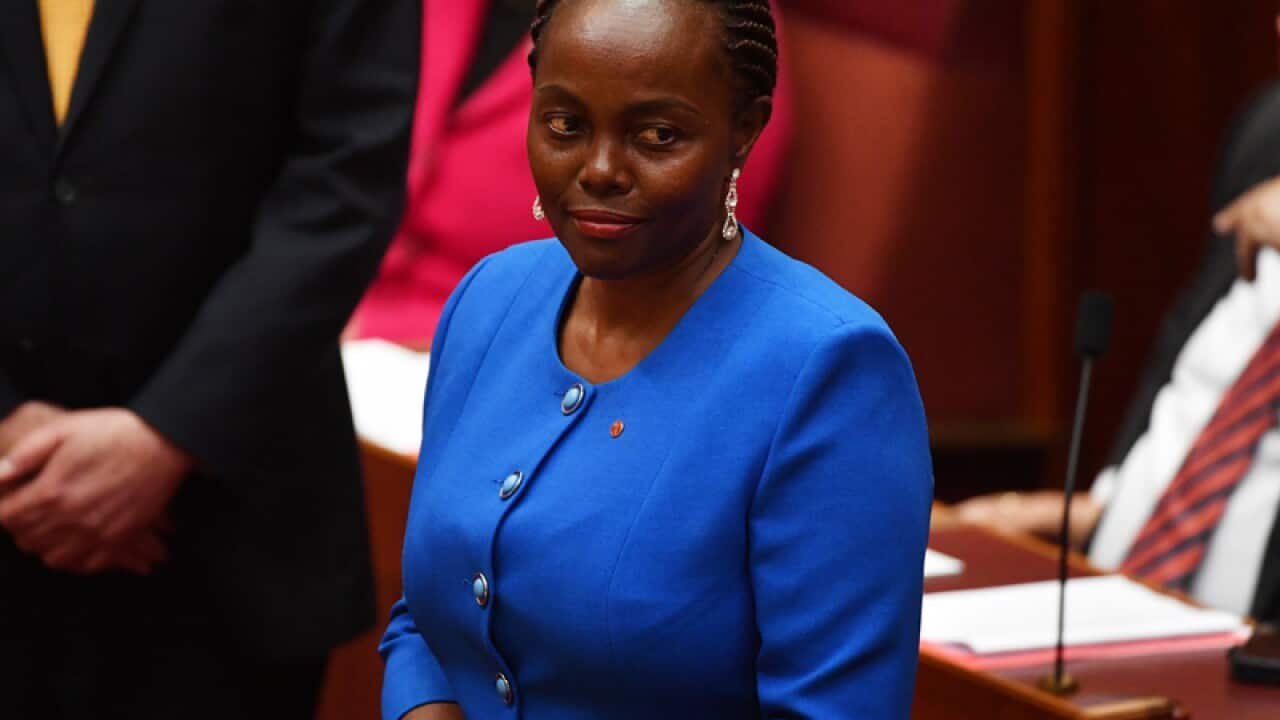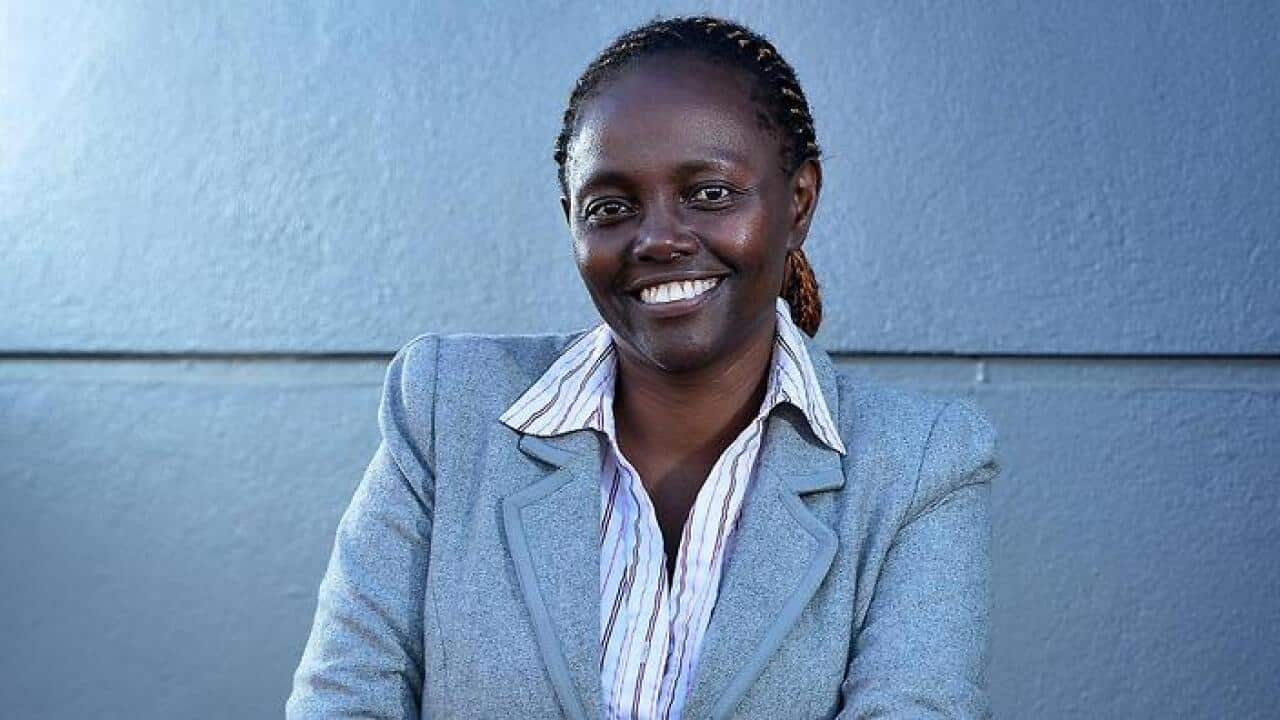Independent Senator Lucy Gichuhi has used her maiden speech to reflect on her remarkable journey from humble beginnings in Kenya to the Australian parliament.
"I am deeply honoured to be given the privilege of serving the people of Australia as a Senator," she began her address, which was watched by Prime Minister Malcolm Turnbull, Opposition Leader Bill Shorten, and her family.
"To all Australians, I say 'thank you'."
She told many stories of the culture shock of moving to Adelaide with her husband, William, and three daughters in 1999.
"I remember the first time we found welfare money in our bank account, shortly after our arrival in Australia.
"We were terrified because we were not used to receiving money from strangers for nothing," which drew some laughs from fellow senators.
"All I knew is that the only time you get money is when you work for it. I said to my husband, we will have to return it."
Senator Gichuhi said it informed her views on the so-called welfare trap, that she believes forces many Australians to become "victims".
"I had to put an end to this tedious welfare-work dance. I chose to work even if that meant going back to school and changing my career path to suit my circumstances," the Senator said.
Political passions
Welfare reform is just one of the issues she will be pursuing, she told the Senate.
"Education in a broader sense, family finance and welfare, senior affairs and aged care, freedom of thought, conscience and belief."
Senator Gichuhi said Australia's diversity is a strength to be embraced.
"Whoever we are, whatever we call ourselves, whatever we come from, it is this great asset of diversity that made me fall in love with Australia," she said.
"The diversity of colour, race, cultural background and allegiance, goes towards making up what we believe it is to be Australian. We are all Australians."
But, she told the Senate, Australian citizenship is "not a right, it is a privilege."
A view she stated in an exclusive interview with SBS World News ahead of her maiden speech.
Where to begin?
Lucy Gichuhi has so many stories and quotes it's hard to figure out which one to tell first.
How about how her father, a primary school teacher, educated his eight daughters in Kenya, despite warnings all they would do is get married and leave him destitute.
Or the one about when she arrived in Adelaide, there were so few black Africans that people would tell her: "'Oh I saw your husband in the market' - just because they had seen another black man."
She starts laughing "that's how few black people there were!"
Or the remarkable chain of events that led her to the red benches of the Senate in Canberra.
'No accident'
The Senate crossbench has seen many a political novice elected in recent years, Victorian Ricky Muir comes to mind, as does Jacqui Lambie, though she’s now a seasoned operator.
Lucy Gichuhi trained as an accountant in Kenya, and moved to Australia with her engineer husband and three young daughters.
At 50 she decided to start a law degree and after completing that, was placed as an intern in the office of then Family First Senator Bob Day, from South Australia.
It’s this which makes her reject the title 'the accidental Senator.'
“There’s nothing accidental about going to law school, staying there for three years, graduating from a law degree, come and do internship.”
"So I don't call it accidental, I call it preparation," she tells SBS World News in her new office in Parliament House, still rather bare, waiting on the artwork MPs and Senators get to choose.
"There is nothing accidental or lucky about putting up your hand to being on a ticket."

Senator Lucy Gichuhi with her mother in Kenya. (Supplied) Source: Supplied
Family First
Family First asked her to be on its South Australian Senate ticket in the 2016 election, number two to Bob Day.
"Family First needed somebody to put on the ticket, I was there and I said 'yeah, it's something I could do.'"
Late last year Bob Day got into trouble. His group of home building companies went into liquidation, and he resigned. But when the High Court then ruled he was invalid to stand because of the financial arrangements of his office, Family First could not nominate his replacement. It would be decided by a recount.
In April, Lucy Gichuhi, was confirmed as Day's replacement, after the High Court rejected questions from Labor about whether she'd properly renounced her Kenyan citizenship.
With that sinking in, came another twist.
Fellow South Australian Senator Cory Bernardi announced that Family First would join his new Australian Conservatives party.
Senator Bernardi said at the time he couldn't delay the merger by waiting for her to “get her head around it.”
I asked if she felt that Family First or Senator Bernardi had pulled the rug from under her, leaving a political newcomer without any party structure to lean on.
The Senator shakes her head.
"No, it didn't bother me," she says.
"All I knew is my coming to Senate was miraculous and dramatic and this was one more dramatic event."
‘I don't operate on extremes’
Senator Gichuhi was raised a Catholic, and is now a member of an African Christian ministry.
This woman knows her own mind and rejects all labels, not just the one of "accidental Senator".
I asked her if her father's wisdom to educate his eight girls and allow them to follow professional careers, and the freedom she's allowed her three daughters to make their way in the world, makes her a feminist.
Not in the slightest.
"I don't operate on extremes, but we grew up knowing, we are women, so what!"
"I mean, what is the difference between a woman and a man, I mean what is the difference? I've got a life to lead," she said emphatically.
"There is nothing 'gender' about being who you are. I don't understand why people want to define things that are just obvious. Do what you need to do, to be who you feel, and who God created you to be."
Senator Gichuhi has given only a few interviews - and learnt some hard lessons on day one in the spotlight, when she left a media conference on the steps of State Parliament in Adelaide without taking any questions.
She has declined to give her views on one topic in particular; same sex marriage.
Given it may come up again this term, I asked whether it should be decided by the parliament or the people, via a plebiscite.
"I do have views, on almost everything, unfortunately," she gave a small laugh.
"But once again there are some things I'm not ready to share because I haven't packaged them. Those are the areas I'm saying I'm not ready for sharing them publicly yet."
But, I pressed on, as a Senator, as an elected official, the public she's accountable to will need to start knowing her views sooner or later.
"Yeah you do, I've given you a lot of views, I've already responded to a lot of views but there are key areas that I'll share when I'm ready," Senator Gichuhi said, before adding, "as a Senator you also want a leader who is grounded enough to make decisions that are firm."

May 2017: Lucy Gichuhi flanked by Penny Wong and George Brandis waits to walk into parliament to be sworn in. Source: AAP
A four step approach
The Coalition could count on Bob Day to vote with it more often than not. Senator Gichuhi says she's going to approach each issue on its merits using a four-step process.
But she will be operating from the guiding motto that "the government of the day is here to govern."
That's her first rule: What does the government want to do?
Step two: "Opposition is here to keep the government checks and balances and transparent."
She wants to know if it’s opposition for opposition’s sake. The third step is using her legal and accounting skills to examine the policy.
And step four? Politics.
"This is a game of politics so we listen around... what is the politics of this? What is the issue here?”
She gave me a great example from the Senate this week, of the Greens’ amendment to remove the GST from tampons and pads, which was defeated by the government and opposition.
Senator Gichuhi thought it was a no brainer.
"I automatically support that motion because I don't know how GST found its way in the first place!" she said.
"I'm a mother of three daughters, you can imagine how much money we spend on that. So that's what I'm talking about, the common sense.”

Senator Gichuhi migrated to Australia with her husband and three daughters in 1999. (Supplied) Source: Supplied
A citizen’s views
With debate this week centred on the government's citizenship test and tougher English language test, I asked if she has decided how she will vote.
No, she said, because she had not looked at the government’s bill in detail and wants to spend the next few weeks doing exactly that.
So I tried from a different angle, what about her gut instinct? As a migrant who has become an Australian citizen.
"I always know, in my mind, that citizenship for migrant is not a right, it is a privilege."
Her most fascinating answer came on the question of migration too, when I asked about how she thinks Africans are settling into Australia, especially from the humanitarian intake.
"Those of us who made the choice to migrate, always keep that choice and that makes a whole lot of difference on how you settle because you know, I can always go back home if I choose to and that gives the freedom of choice.
“I'm here because I want and that is very empowering in itself.
“I feel so sorry and sad for people who had to move for survival, it's a whole different group and a whole different, yeah,” she trails off.
But Australia, where she is now an elected representative of the people, is very much home.
"Twenty years on, oh I love it. Australia is so beautiful just because of that diversity."
"I can see an Italian, an Asian, a European all in one market. So to me, that's it, that's the beauty."










